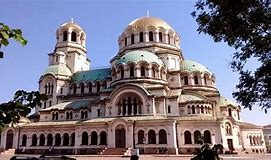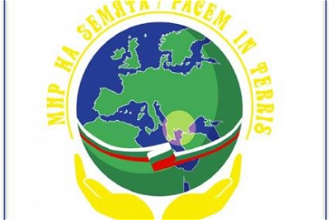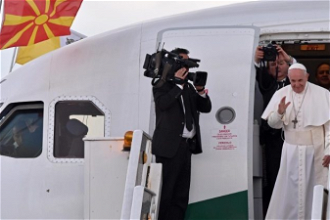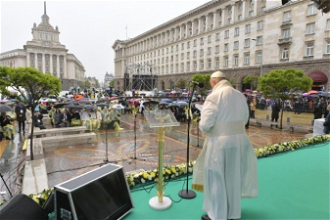Bulgaria's revolution at the Cathedral

Saint Alexander Nevsky Cathedral
The Bulgarian people quietly overthrew their Communist rulers in March 1990, a few months after the tide of people power had swept through the rest of Eastern Europe in the autumn of 1989. However, the revolution was incomplete until June 1992, when a peaceful uprising forced the Orthodox church to atone for its sins.
My husband Henry and I were lucky enough to arrive in Sofia on the day crowds gathered outside Saint Alexander Nevsky Cathedral. Thousands of people held home-made signs, their attention focused on the Byzantine-style building at the far end of the broad piazza in the centre of the Bulgarian capital.
An English-speaking local kindly explained the crowd's demands: they wanted the church hierarchy, along with the patriarch, to resign. He said the leading lights of Bulgarian Orthodoxy had done the Communists' bidding for them during the years of Stalinist rule. Rather than siding with the people, the elite clergy had acquiesced and pandered to the repressive authorities. This, he said, was the people's last piece of unfinished business.
The crowd suddenly roared its approval as a group of clerics emerged from the cathedral, their heads bowed. There was hissing and booing as the grey-haired men slipped into waiting limousines and were driven away. The crowd parted to allow several younger priests with dark beards and ponytails to walk toward the front. Everyone cheered the men in their simple cassocks and high hats, and our new acquaintance explained that these men had stood with the people during the worst times, even though it had cost them their careers. The heroes acknowledged the crowd with smiles and waves, and entered the cathedral. Out with the old regime and in with the new, and not a dry eye in the square.
After congratulating the helpful English-speaker, we following Sofia's distinctive yellow brick road through the old part of town. The boulevards, devoid of private cars, were lined with fine nineteenth century mansion blocks that would not have been out of place in Paris. The outskirts of the capital might have been studded with the usual grimy, Brezhnev-era apartments, but the centre was typical of the late 1800s' Central Europe. There were pictures of the recently-returned king, Simeon, everywhere, in store fronts and people's apartment windows. The Communists had expelled him when he was a boy, but Simeon Saxe-Coburg-Gotha came back when the uprising began, and would later be elected prime minister.
Amid the nineteenth century caryatids and neo-classical porticos was the brutalist mausoleum of Georgi Dimitrov, Bulgaria's first Communist leader, and the man who had ejected the boy-king Simeon in 1946. The dingy concrete walls were splattered with what we assumed was unflattering graffiti. Dimitrov seized power after the Second World War, and was responsible for the execution of thousands of dissidents, and the torture of a many more. His successor, Todor Zhivkov, threw in the towel without a fight when the Berlin Wall came down.
The Silence of the Lambs
During Bulgaria's uprising, the imperious façade of the Communist Party headquarters had been blackened by a small fire, lit by protestors venting their fury at decades of economic stagnation and political repression. The portrait of Lenin over the entrance was replaced by Jodie Foster advertising "The Silence of the Lambs." This was not an ironic political statement: the grandiose main hall was now a cinema. No longer would apparatchiks fabricate optimistic grain-output statistics in its marble corridors. Citizens who would once have dreaded being summoned to the Stalinist monstrosity now sauntered in for an expresso before the main feature. Within a generation, people would probably forget that the commissars in this building had sent entire families to the gulag because one of their uncles had defected to the West.
The Bulgarians held their first credible elections in June 1990. Two years later, when we visited, free speech and democracy still had novelty value, with people sitting in the park with radios, tuning in to the first meaningful parliamentary debates of their lifetimes. They had waited centuries to choose their own leaders: the Bulgarians had been occupied by the empires of Thrace, Byzantium, the Ottomans, the Goths, Slavs and the Nazis. During the Second World War they were on the Axis side, but they distinguished themselves by refusing to hand over their Jewish population, and opting out of Operation Barbarossa, Hitler's bloody and futile invasion of the Soviet Union.
However, there was a new force of occupation in town: the Greeks. They were everywhere, selling brightly coloured cheap plastic items from China, and running pizza parlours. Otherwise, it was hard to see how anyone was making a living, now that the state factories had been closed. There were garish posters everywhere, advertising the services of entrepreneurial consultants, but who had the money to hire them?
The only other foreigners were North American evangelicals. Doughy-fleshed, in ill-fitting suits, white shirts and boring ties, they held prayer meetings in the elevators of our hotel, and sang jolly songs loudly at anti-social hours. (They didn't seem to know the bit about loving one's neighbour).
When I asked one evangelical why he and his friends were in Bulgaria, he told me they were saving souls. He grinned giddily when we pointed out the Bulgarians had been dying for the faith - the eastern Orthodox church - for centuries. He hadn't noticed the Byzantine churches and monasteries, and he didn't know the Turks had occupied Bulgaria for five hundred years. He was unmoved that the Bulgarians have been Christians longer than anyone in Kentucky or Arizona.
One morning, we witnessed Orthodoxy in action. As we entered a shop we were politely turned away by a flustered young woman in a mini-skirt. In excellent English she explained that there was "a crisis," and that she would return soon. She dashed off, looking panic-stricken. Taking her at her word, we ordered a coffee at a nearby pavement café, and waited. She soon reappeared with a priest. We watched as he produced a stick, asked for a bowl of water, and then exorcised the shop.
There was a more recognisably European atmosphere at the opera. For the equivalent of 45 pence/65 cents, we had excellent seats for Aida. In the interval, Sofia's middle class sipped luminous soft drinks in the faded splendour of the theatre bar. Here were the quiet, bookish people who kept a private flame of intellectual life going through the years of Communism; the dignified, badly-paid professionals who would later board dilapidated street cars with sticky seats, going back to ugly, crumbling housing projects on the edge of the city.
I still have the playbill for that performance of Aida; it is a single sheet of inexpensive paper. On each one, the staff had painstakingly handwritten the change of cast-members due to illness. No glossy advertising or photographs; just a flimsy piece of paper, to be taken home, as a memento of a splendid evening at the theatre. Somehow that humble opera programme sums up the tragedy of Bulgaria, occupied for centuries by brutes, neglected and exploited by the Soviets, and poverty-stricken as it began its journey toward being a modern European country. And yet despite it all, they were determined to keep their culture alive, however modestly.
When No Means Yes
At the railway station, we found we hadn't allowed enough time to buy our tickets for Veliko Tarnovo, so we stood in line, twitching with nerves, checking our watches and rehearsing our few words of mangled Bulgarian. Finally, travel documents in hand, and with only 30 seconds to go, we hustled up the platform to what we thought was our train. We climbed into a carriage and asked, breathlessly, "Veliko Tarnovo?" We indicated the floor with a universally understood gesture. Everyone shook their heads. We backed up, panic-stricken, about to get off, but the other passengers started yelling, "Veliko Tarnovo! Da! Da!" And, just in time, we recalled that Bulgarians shake their heads to say yes and nod to say no.
Our train travelled through alpine scenery, snow-capped mountains, dramatic gorges and then broad valleys full of roses, vines, tobacco, poppies and wild flowers. Occasionally, high on a precipice, we spotted a zebra-striped monastery clinging to the rock face. Down in the valleys, there were horse-drawn carts. The Russians had used the Bulgarians as guinea pigs for their cutting-edge industrial "technology." Consequently, lakes glowed with pollution, and each valley contained the wreck of an iron smelting plant or an abandoned factory, disintegrating into the dirt.
Veliko Tarnovo was built on three steep hills around which the Yantra river meandered like a piece of spaghetti. The city was surrounded by 12th Century walls, dotted with crenelated towers. We climbed its narrow, cobbled streets, admiring churches and Turkish-style wooden homes. Veliko Tarnovo fell to the Ottomans in 1393, but remained a centre of Christian resistance throughout the next five hundred years of Turkish occupation. The current forces of law and order -the local police - could be found sipping Turkish coffee in a café, mesmerised by twenty-year-old episodes of The Streets of San Francisco, new to Bulgarian television.
Outside, in the alleyways, old women in headscarves boiled up cauldrons of fresh strawberries, making the winter's supply of jam. The food on offer was Eastern Mediterranean fare; stuffed vine leaves and peppers, grilled aubergine, lamb kebabs, feta cheese and salads of cucumber, tomato and red onions. Accompanied by the local Merlot, it was a delight to spend an evening on the vine-shaded terrace of a restaurant.
Soviet Bloc Hotel-Keeping
When we visited in 1992, Veliko Tarnovo had few tourists, and our hotel was almost empty. It had been built during the Brezhnev era, with vast public spaces decorated with dusty, withering pot plants and sagging net curtains. On the walls were murals featuring strange shapes, like germs under a microscope. Rows of chairs upholstered in polyester, and plywood coffee tables were lined up in military fashion, awaiting hotel residents who never materialised.
Perhaps the architects had in mind tractor factory managers, sipping warm Fanta, while discussing improbable production targets with their fellow businessmen. The Communists had a love-hate relationship with businessmen (it was always men). In theory, capitalism was scorned. Yet the workers' paradise had created a social class of entitled bosses with ties that dangled halfway down their paunches. They had chauffeur-driven limousines and apartments in gated communities. And their families went to supermarkets stocked with products unavailable to the people who drove buses or taught in kindergartens. This elite were the only people in the hotel bar in the evening, a room that was modelled on Moscow's notion of a 1970s Western disco, complete with smoked mirrors and oversized banquettes in fake leather.
The businessmen were nowhere to be seen at breakfast. However, several men dressed like Afghan tribesmen appeared. They carefully un-holstering their pistols, laying them on the table beside their yoghurt.
Since our visit, the hotel in Veliko Tarnovo has probably been bought and renovated by an international chain. However, its condition in 1992 was noteworthy because it combined many features that were the hallmark of Soviet bloc hotel-keeping. In our room were leading-edge Socialist consumer electrical products: the phone had no dial; the radio was a shell; the TV worked occasionally, broadcasting gymnastics displays; the electric clock was broken; most of the light bulbs had burned out; and half the electric sockets had wiggled free of the walls.
Unlike many Soviet bloc hotels, our bath tub had a plug. However, unless one angled the plug cleverly to reduce the flow, the waste water would gurgle down the dark, furry drain and then bubble up again through an equally furry grille in the bathroom floor, flooding the room. The vent in the shower looked like the jaws of a monster unfamiliar with oral hygiene.
The bathroom was covered in the same turquois tiles found everywhere behind the Iron Curtain, from Samarkand to Crackow. Perhaps, back in the 1960s, a bureaucrat had mistakenly put too many zeroes on an order form, and the excess of turquois tiles had been distributed throughout Eastern Europe. Evidently, some enterprising commissar had also sent them in the form of ComIntern aid to brotherly Africa states. The same tiles can be seen in Khartoum and Addis where the locals keep up the tradition of poor installation.
The hotel elevator shuddered unexpectedly and made creaking noises, suggesting the cable suspending it in the shaft was on the verge of snapping. In the event the elevator became stuck, there were plenty of notices to read to pass the time, while waiting for someone to answer the distress call. One set of instructions required "correct stepping in and out." Nobody with a contagious disease, or members of their family, were allowed to ride the elevator. It couldn't be used for transporting engines or combustible substances or gas cylinders. Among the many forbidden forms of cargo was bee keeping equipment. Since the fall of the Berlin Wall there are probably no more officials earnestly debating the correct stepping in and out of elevators, and the world is a poorer place for it.
We took a local train out of Veliko Tarnovo to visit a fine old monastery, but half way through the journey a guard came rocking along the swaying carriage, and he took issue with the tickets we had bought. He spoke no English or French or German, and we spoke no Bulgarian. Although we smiled and looked apologetic, he was unmoved. Up until the inspector arrived, the other passengers had looked at us as if we had just arrived from another planet. However, the moment the official started giving us grief, they rallied to our side, berating the guard, and sending him away. Their natural hatred of officialdom, after decades of being bossed about, meant they instinctively sided with the peculiar foreigners. When we arrived at our destination, a mere halt in the countryside, there was a woman selling live chickens on the platform.
Useful Idiots
In 1992, most of the available books about Bulgaria were written by apologists for the Communists. In 1964, when gay meant jolly, a man called Stowers Johnson produced "Gay Bulgaria." In it, he described, "splendid housing complexes and flats in the Lenin Housing estate," although he didn't go into one, where he would have found five families sharing one kitchen and a bathroom between them. He wrote, approvingly, that officials had promised him "those old buildings" (nineteenth century houses with cornicing, panelled doors, and ornate brick and plaster exteriors) would soon be torn down to make way for more concrete jungles.
Johnson was shown well-stocked grocery stores, used exclusively by Communist Party big wigs, and he concluded, without any evidence, that all Bulgarians had access to similar food shops, "as one might find in London." He lacked the curiosity to discover that produce was rotting in the fields, while there were shortages in the cities. He was taken to model factories but did not realise that the Russians had insisted the Bulgarians crank out tractors and heavy plant that no one wanted to buy. Nor would the Russians allow Bulgaria to make spare parts, because that would mean admitting their production system and design wasn't perfect. Hence the Soviet Union and Eastern Bloc (and their African brother nations) were littered with broken machines.
Another visitor, writing in 1976, witnessed schoolchildren being encouraged to denounce their parents for their bourgeois thought. However, he was not alone in his myopia: Sydney and Beatrice Webb, and George Bernard Shaw visited during Stalin's most repressive years, when the Lubyanka was a meat-grinder, the gulags were overflowing, and millions of kulaks starved in rural areas. They returned to Britain saying that any stories about mass starvation were just lies. This line was used by their successors, despite Khrushchev's secret speech revealing Stalin's mass murder, persecution of Christians in Poland, the crushing of the Hungarian Uprising in 1956 and the Prague Spring in 1968, and the invasion of Afghanistan in 1979. Lenin used to call these Western boosters "useful idiots." Meanwhile, George Steiner, who travelled to the Soviet Union at the same time as the Webbs, returned with horrific tales of seeing thousands of skeletal families eating grass.
Bulgaria's Teddy Boy War
Bernard Newman, a more observant writer, describes an episode called The Teddy Boy War. Originating as a British post-war teen subculture, Teds had their hair Brylcreemed into a D.A., they wore drape coats, drain pipe trousers and beetle-crusher boots. They first emerged when the Bill Haley film "Rock Around the Clock" aired in British cinemas in 1956, and the craze penetrated the Iron Curtain. A Communist Party official on a street car in Sofia reprimanded a couple of Teds for their distinctive clothes. It was unusual for civilians to argue with officials, but on this occasion, the Teds fought back. The official tried to get them arrested, so the Teds killed the bureaucrat. No bystanders intervened to help the Party official.
Outraged, the regime declared war on anyone wearing clothing of Western design or origin. Between two and three thousand young Bulgarians were sent to gulags because of the way they dressed. The wife of an officer at the French legation was arrested for wearing tight silk trousers, although a crowd gathered around her and booed the police until they let her go. At this point, someone in authority realised that the clothes that so offended the regime were actually being made in Communist Poland by a state trading company. The Teds in the gulag were abruptly released because "they were repentant," according to the Party.
Neglected Monasteries
Bulgaria has 120 monasteries, credited with safeguarding the nation's identity during the Ottoman occupation, if not in Communist era. Some, like Rila, have distinctive black and white or red and white horizontal stripes, similar to the cathedral in Sienna. Others are less ornate, perched on mountain ledges, built of roughly hewn stone, as if they have grown out of the rock face. At one, the monks were drinking coke, minding stalls selling a bewildering array of merchandise: Michael Jackson cassettes, light bulbs and bras.
Using a travel guide from the Thirties, we found a monastery many miles up a mountain path. Icons and murals of hellfire and monsters covered every inch of the walls, inside and out. There were no other visitors, apart from a few grazing sheep. It was falling apart, too obscure to benefit, or suffer, from mass tourism anytime soon, since Bulgaria remains so unjustly ignored.
Fake News and Disraeli
In 1876, the British Liberal leader, William Gladstone, raised the "Bulgarian Atrocities" repeatedly in Parliament. The Turks, he reported, were crushing a Bulgarian independence movement, slaughtering unarmed Christians in their thousands. However, the Prime Minister, Benjamin Disraeli, said the atrocities were imaginary. In fact, Disraeli knew the Turks were massacring Bulgarians, but at the time, Europe and the West were bolstering Turkey against Russian expansionism. The real geopolitical game was containing Russia: the Christians paid with their lives.
As it turned out, Russia invaded Bulgaria anyway, saving their fellow Orthodox Christians, defeating the Turks, and precipitating the end of the Ottoman empire. Because Europe averted its eyes, Russia could later claim to have Bulgaria within its sphere of influence, thereby proving that avoiding or denying genocide is never a viable strategy: there is always blowback. A perfect example of that occurred in the same region a century later, when Europe ignored the genocide of Bosnian Muslims. A common motivation given by the 9/11 hijackers was that the West had allowed Bosnian Muslims to be slaughtered without lifting a finger.
Bulgaria has since joined NATO and the European Union. It has held off Vladimir Putin's poisonous embrace, while acknowledging a debt of gratitude to Russia for liberating them from the Ottomans. Yet, although it was at the crossroads of empires and trade routes for most of its history, it is now a backwater.
It was a privilege to witness Bulgarians grasping freedom when we visited. However, we found many local people took a philosophical view of their prospects. They seemed fatalistic about the absence of investment from the same Western countries that had encouraged them to reject their Soviet masters. Perhaps that is the curse, or the advantage, of having seen it all before over the centuries.
LINK


















